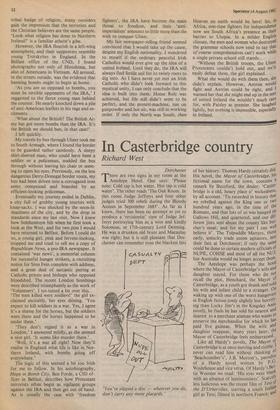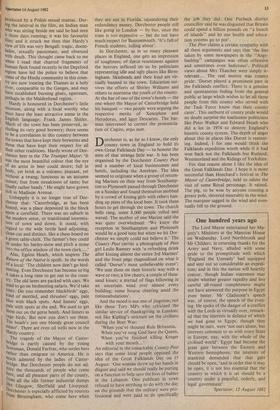In Casterbridge country
Richard West
Dorchester
There are two signs in my room at the Antelope Hotel. One says: 'Please note: Cold tap is hot water. Hot tap is cold water'. The other reads 'The Oak Room. In this room Judge Jeffreys and four other judges tried 300 rebels during the Bloody Assizes in September 1685'. As far as I know, there has been no attempt as yet to produce a 'revisionist' view of Judge Jef- freys portraying him as a wise and kindly Solomon, or 17th-century Lord Denning. He was a drunken old brute and Macaulay was right; but it is still pleasant that Dor- chester can remember even the blackest bits
'You've slipped a disc — whatever you do, don't carry any more placards.'
of her history. Thomas Hardy certainly did. His novel, the Mayor of Casterbridge, his fictional name for the town, contains a remark by Buzzford, the dealer: 'Caster- bridge is a old, hoary place o' wickedness, by all account. 'Tis recorded in history that we rebelled against the King one or two hundred years ago, in the time of the Romans, and that lots of us was hanged on Gallows Hill, and quartered, and our dif- ferent jints sent about the county like but- cher's meat; and for my part I can well believe it'. The Tolpuddle Martyrs, those early, unlucky trade union agitators, met their fate at Dorchester; if only the same could be done to certain modern officials of NUPE, COHSE and most of all the NUJ; but Australia would no longer accept them. The Antelope was perhaps the hotel where the Mayor of Casterbridge's wife and daughter stayed. For those who do not recall the plot, Henchard, the Mayor of Casterbridge, as a youth got drunk and sold his wife and infant child to a stranger. On waking up with one of the worst hangovers in English fiction (only slightly less horrify' ing than Lucky Jim's in the Kingsley Arms novel), he finds he has sold his nearest and dearest to a merchant seaman who wants to preserve the merchandise for which he has, paid five guineas. When the wife and daughter reappear, many years later, the Mayor of Casterbridge feels embarrassed. Like all Hardy's novels, The Mayor of Casterbridge is at once moving and risible. I, never can read him without thinking .01 'Beachcomber's', J.B. Morton's, parodies of a Hardy novel written by P.G" Wodehouse and vice versa. Of Hardy's Bet- tie Wooster we read: 'His eyes were blank with an absence of luminousness'. ScarcelY, less ludicrous was the recent film of Tess o.1 the D'Urbervilles, starring a south Italian as Tess; filmed in northern France; and
Produced by a Polish sexual maniac. Dur- ing the interval in the film, an Indian man Who was sitting beside me said he had seen it three days running; it was his favourite film; and it struck me then that Hardy's view of life was very Bengali: tragic, doom- laden, sexually passionate, and obsessed with death. This thought came back to me when I read that charred fragments of human flesh found recently in the Deptford region have led the police to believe that some of the Hindu community in this coun- try are now treating the Thames as a holy river, comparable to the Ganges, and may have established burning ghats, upstream, Perhaps in the Maidenhead region.
Hardy is honoured in Dorchester's little Museum, along with a local worthy who Must have the least attractive name in the English language: Frank James Shitler. Much of the town has been preserved, in- cluding its very good brewery; there seems to be a correlation in this country between the towns that have kept their breweries and those that have kept their respect for all their other traditions. Hardy wrote of Dor- chester beer in the The Trumpet Major: 'It Was the most beautiful colour that the eye of an artist in beer could desire; full in body, yet brisk as a volcano; piquant, yet without a twang; luminous as an autumn sunset; free from streakiness of taste; but finally rather heady.' He might have grown rich in Madison Avenue.
Unhappily it is no longer true of Dor- chester that: `Casterbridge, as has been hinted, was a place deposited in the block upon a cornfield. There was no suburb in the modern sense, or transitional intermix- ture of town and down. It stood, with regard to the wide fertile land adjoining, clean-cut and distinct, like a chess-board on agreen table-cloth. The farmer's boy could .
under his barley-mow and pitch a stone Into the office window of the town clerk....'
Alas, Egdon Heath, which inspires The Return of the Native is spoilt. In the words of a local: 'The children now don't go bird- nesting. Even Dorchester has become so big It takes a long time to get out to the coun- try. The old lanes are packed with cars. We used to go on birdnesting safaris. We'd take tents. Do you remember blackbirds' eggs, blue of mottled, and thrushes' eggs, pale °lue with black spots. And linnets' eggs, Pale with spots at the end. We used to get them out on the gorse heath. And linnets as cage birds. But now you don't see them. The heath's just one bloody great council estate'. There are even oil wells now in the Hardy country.
The tragedy of the Mayor of Caster- bridge is partly caused by the young Scotsman, Donald Farfrae, who settles here rather than emigrate to America. He is Much admired by the ladies of Caster- bridge. But Dorchester people do not ad- Mire the thousands of people who come here, and all pleasant parts of the county, from all the idle former industrial dumps ke Glasgow, Sheffield and Liverpool. Dorchester is especially afflicted by tourists from Birmingham, who come here when
they are not in Florida, squandering their redundancy money. Dorchester people still like going to London — by bus, since the train is too expensive — but do not have much respect for Bournemouth. 'It's full of French students, lolling about'.
In Dorchester, as in so many pleasant places in England, one gets an impression of toughness; of fierce resentment against the horrors inflicted on us by politicians representing idle and ugly places like Birm- ingham. Skinheads and their kind are vir- tually banned in the town. Education sur- vives the efforts of Shirley Williams and others to moronise the youth of the county. At the bar of one of the town's hotels — the one where the Mayor of Casterbridge held his banquet — two people were arguing the respective merits of Xenophon and Herodotus, and later Descartes. The bar- man intervened to correct the pronuncia- tion of Cogito, ergo sum.
Dorchester is, as far as I know, the only county town in England to hold its own Great Falklands Day — to honour the men of that strange little war. It has been organised by the Dorchester County Post and a number of local businessmen and hotels, including the Antelope. The idea seemed to originate when a group of return- ing Marines on their way from Southamp- ton to Plymouth passed through Dorchester on a Sunday and found themselves mobbed by a crowd of kissing girls with others han- ding up pints of the local beer. It took them hours to get through the town. The church bells rang, some 8,000 people yelled and waved. The mother of one Marine said she was quite overwhelmed: 'We knew the reception in Southampton and Plymouth would be a good turn but when we hit Dor- chester we simply could not believe it.' The County Post carries a photograph of Post girl Leslie Ramsey with 'a refreshing drink after kissing almost the entire 3rd Marines' and the front page rhapsodised on what it called 'Dorset's most unbelievable event'; `We sent them on their historic way with a wave or two; a few cheers; a couple of thou- sand kisses; a myriad of flags billowing in an uncertain wind over almost every building; some hoarse cheering amid the tintinnabulations'.
And the mood is not one of jingoism; not like those Tory MPs who criticised the similar service of thanksgiving in London; not like Kipling's stricture on the civilians during the Boer War: `When you've shouted Rule Britannia, When you've sung God Save the Queen, When you've finished killing Kruger with your mouth...'
An editorial in the remarkable County Post says that some local people opposed the
idea of the Great Falklands Day on 15 August: 'One woman threw up her hands in disgust and said we should really be putting on a function to help save the lives of babies in the Lebanon. One publican in town refused to have anything to do with the day on the grounds that the military were pro- fessional and were paid to do specifically the job they did. One Purbeck district councillor said he was disgusted that Britain could spend a billion pounds on "a bunch of islands" and let our health and educa- tion systems go to pot'.
The Post claims a certain sympathy with all these arguments and says that 'the line taken by some newspapers in the "Argy- bashing" campaigns was often offensive and sometimes even ludicrous'. Political views about Mrs Thatcher were simply ir- relevant... The real motive was county pride: 'Dorset played a prominent part in the Falklands conflict. There is a genuine and spontaneous feeling from the general public at large which wishes to let all those people from this county who served with the Task Force know that their county cares'. This outburst of county pride would no doubt surprise the loathsome politicians like Peter Walker and Edward Heath who did a lot in 1974 to destroy England's historic county system. The depth of anger about this in places like Dorset is reassur- ing. Indeed, I for one would think the Falklands expedition worth while if it had won back not the Falklands but Rutland, Westmorland and the Ridings of Yorkshire.
For that reason alone 1 like the idea of the Great Falklands Day. I hope it is more successful than Henchard's festival in The Mayor of Casterbridge, held to salute the visit of some Royal personage. It rained. The pig, to be won by anyone crossing a greasy pole, shivered miserably in the wind. The marquee sagged in the wind and even- tually fell to the ground.



































 Previous page
Previous page